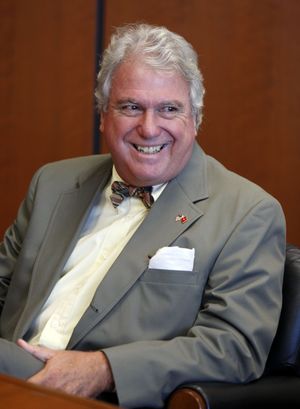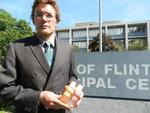|
VCOG notes
John Stewart "Sewart" Bryan III — former Richmond Times-Dispatch editor and president of Media General — died Jan. 23 of complications resulting from a fall he took earlier that month.
Stewart was a founding director of VCOG and he held the media seat on the Freedom of Information Advisory Council when it was first created. Under his leadership, Media General was one of the top supporters of VCOG. MG made a critical multi-year pledge to VCOG that helped secure our endowment in 2006.
 Even after he stepped down from the VCOG board, Stewart remained accessible to me when I had questions or needed help, and he made generous annual personal contributions to our organization. He was a oenophile, which meant those contributions sometimes took the form of wine for board dinners! Even after he stepped down from the VCOG board, Stewart remained accessible to me when I had questions or needed help, and he made generous annual personal contributions to our organization. He was a oenophile, which meant those contributions sometimes took the form of wine for board dinners!
When I first became affiliated with VCOG I remember that at board meetings, when Stewart got up and started pacing the room, it was the signal that we needed to wrap things up post haste.
Stewart’s obituary suggests donations be made to the Virginia Historical Society or a charity of one’s choice.
Virginia Tech to Flint with FOIA
 Virginia Tech professor Marc Edwards has become the poster child of why FOIA matters. Fresh off his work to protect D.C. residents from lead in the city’s water, using a $500,000 MacArthur Foundation genius grant and his own money, Edwards was contacted by a mother in Flint, Michigan, who suspected there was something wrong with the city’s water supply. Edwards collected water samples and set up a website to update the public on his findings. Virginia Tech professor Marc Edwards has become the poster child of why FOIA matters. Fresh off his work to protect D.C. residents from lead in the city’s water, using a $500,000 MacArthur Foundation genius grant and his own money, Edwards was contacted by a mother in Flint, Michigan, who suspected there was something wrong with the city’s water supply. Edwards collected water samples and set up a website to update the public on his findings.
And he filed FOIA requests for emails chains between and among city and state officials to find out what they knew and when they knew it. What he found were officials who knew of the problems for months but did nothing because they viewed it as a political problem, not a public health crisis.
A GoFundMe page has been set up to help pay for the costs of his investigation, and according to the Washington Post, the Notre Dame basketball team presented Virginia Tech with a $2,000 check for its work for Flint. Edwards has since been hired by Flint to oversee water testing.
It is worth noting, too, that even though Edwards was in Virginia, he could use the Michigan FOIA to get records. That couldn't happen if he were a Michigan professor who wanted to research, say, the impact on Danville of Duke Power's coal ash spill in the Dan River. Why? Because Virginia says requests from out of state do not have to be answered. |
Stay up to date on access
Sign up for VCOG's daily listserv on access and First Amendment news from Virginia and accross the country. It's free! |
|
|
Session opens, both more and less open
 The General Assembly took a bit of a beating last spring when the Transparency Virginia group issued its report finding several practices by both the House and Senate that served as obstacles to public engagement with and observation of the legislative process. (VCOG’s Megan Rhyne was the report’s principal author.) Actions taken as the 2016 session got under way suggest the atmosphere might be different this year. The General Assembly took a bit of a beating last spring when the Transparency Virginia group issued its report finding several practices by both the House and Senate that served as obstacles to public engagement with and observation of the legislative process. (VCOG’s Megan Rhyne was the report’s principal author.) Actions taken as the 2016 session got under way suggest the atmosphere might be different this year.
As the session started, Speaker of House William Howell (R-Fredericksburg) announced some positive changes: a waiting period before the budget conference report can be voted on, a limitation on meetings being called at a member’s desk on the House floor, and a new email notification system for committee and subcommittee meetings and changes to meeting dockets.
Del. Mark Levine (D-Alexandria) and Sen. Amanda Chase (R-Chesterfield), both newly elected, announced the formation of the Transparency Caucus. The pair have agreed to record subcommittee meetings where their bills come up for discussion, and to request a recorded vote on all of their bills. They are asking other legislators to join the caucus — hoping to maintain an even balance of Republican and Democratic members — by pledging to ask for recorded votes on all of their bills, too.
On the other hand, Sen. Tommy Norment (R-Williamsburg) kicked off the session by kicking the press off the Senate floor, requiring them to sit in the gallery instead, where some senators cannot be seen and where reporters do not have access to floor amendments. Sen. Tom Garrett (R-Hadensville) indicated he would introduce a motion to let the press back onto the floor, but such a motion became moot when Senate leaders and representatives of the Virginia Capitol Correspondents worked out a compromise Jan. 29. The press has been allowed back on the floor, though they must now sit in chairs reminiscent of the grade-school all-in-one chair and desk. Reporters can use laptops, but they will not be allowed to plug them in to the outlets.
Tracking bills at the General Assembly
VCOG is following approximately 70 bills affecting FOIA and access this year. That sounds like a lot, but that does include some duplicates, and — better than that — many of them are decidedly pro-access. There are bills on public comment periods, recorded votes, designating FOIA officers and correcting a Virginia Supreme Court opinion on redaction.
There are some bills that do not promote transparency in government, however, including two that restrict access to salary data, one that would grant small localities a total of 35 days to respond to FOIA requests, and two that would exempt from disclosure the chemicals companies use in hydraulic fracturing.
A Senate subcommittee is scheduled for Tuesday, Feb. 2, to consider many of the bills noted above. Read VCOG’s positions on those bills, as well as its position on bills heard by a House subcommittee last week.
Follow the bills we follow on our website. Scroll down to the bottom of the bill chart for a tab to a list of bills by committee and subcommittee. Or, follow bills on any and all bills on the General Assembly's legislative information system.
Open government in the news
With the swearing in of new local officials across the state came reconsideration of the rules their boards would abide by, including those rules on public comment. The Town of Culpeper opted to take a “hands-off” approach, declining to restrict even personal insults within a speaker’s comments. James City County supervisors discussed whether comments on national issues should be allowed, and a proposal to implement something called a “public caucus” was suggested. Loudoun considered a revision to its standards of conduct that eliminated the provision to be “open minded and patient . . . [to] allow all citizens, employees, or colleagues sufficient opportunity to present their views.” . . . Norfolk Treasurer Anthony Burfoot was arrested Jan. 8, accused in eight counts of using his influence while serving on the city council for more than a decade to funnel work and favors to local businessmen. Burfoot has remained on the job at the treasurer’s office, with a judge weighing in on Jan. 28 that he was not allowed to speak to any of his employees who might be called to testify against him. . . . Attorneys for two title loan companies argued during a Virginia State Corporation Commission hearing that their businesses would be seriously harmed if the SCC divulged their annual financial reports. The companies claimed the information in the reports was a trade secret and constituted “personal financial information.” Though counsel to the three SCC commissioners said that protection was for consumers, not companies, the commissioners said they would seek briefs and take the matter under advisement. . . . Three members of the Newport News City Council floated the idea to videotape their work sessions and make those videos available to the public. . . . The Newport News City Council approved a $2 million settlement with a wrongfully convicted man without taking a public vote. Settlements over $250,000 have to be approved by the council, but City Attorney Collins L. Owens Jr. said that members were asked one by one in a closed meeting whether they approved of the settlement. . . . Newport News also skipped posting notice of a six-hour retreat on its website. Notice is not required to be posted on websites, but the city usually uses its website for notices of city council regular meetings, work sessions and special meetings. No members of the public attended. . . . The Isle of Wight Board of Supervisors voted to tear down a wooden barricade that has separated the council from the audience since August 2014. The lone vote for keeping the barricade said the partition might not stop someone from doing harm, but “it will give you chance to get maybe through that door.” . . . Hampton held a 3.5-hour closed session on a range of topics some said exceeded the scope of FOIA exemptions for personnel. Among the topics were the “roles and expectations” for the city manager, city clerk and city attorney. A council member said the discussion included the performance evaluations of the current holders of those positions. FOIA attorney Andrew Bodoh of Richmond disagreed that this was necessarily true. . . . Portsmouth City Council member Bill Moody was fined $1,500 for announcing in a Facebook post in December that the council was going to have a closed meeting to discuss removing a Confederate monument. A transcript of the closed meeting when the fine was imposed revealed that the mayor acknowledged that Moody had not violated a rule about speaking about closed-door matters, “but I think it merits the same type of penalty.” . . . The Virginia State Board of Elections voted along party lines to start the process to remove Prince William Electoral Board chair Guy Anthony “Tony” Guiffré from office for exposing voters’ Social Security numbers and birth dates and for making unredacted copies of sensitive voting materials. . . . A FOIA request revealed at least 107 email messages to and from the Richmond public works director related to construction of a new campus for the church headed by Mayor Dwight C. Jones. The messages show the director had spent far longer on the project than the 38 hours he originally estimated. Jones has asked Virginia State Police to investigate. |
|



 Virginia Tech professor Marc Edwards has become the poster child of why FOIA matters. Fresh off his work to protect D.C. residents from lead in the city’s water,
Virginia Tech professor Marc Edwards has become the poster child of why FOIA matters. Fresh off his work to protect D.C. residents from lead in the city’s water, 